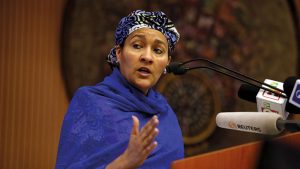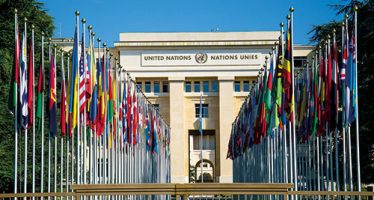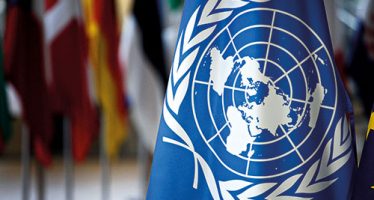Amina J Mohammed: Energy for Sustainable Goals

Deputy Secretary-General: Amina J Mohammed
If, by way of magic, cynicism and indifference could be banned, the world would undoubtedly be a much happier place.
For United Nations Deputy Secretary-General Amina J Mohammed (56) those two deplorable traits represent the principal obstacles to meeting the sustainable development goals (SDGs) which, incidentally, she helped boil down to just 17 from the 500 or so originally submitted. “Cynicism is such a killer,” she says. “I have no patience at all with people who start out by saying that things can’t be done.”
Mohammed is used to getting things done, such as securing the funding for a 250-bed hospital she helped design in Gombe, the city in north-eastern Nigeria, where she was born, when she worked at an architectural design bureau. Adding willpower to perseverance, she managed to get the facility built. It has since become her signatory style: where there is a will, there is bound to be a way – and she will find it. That philosophy drove Amina J Mohammed to the top.
Ahead of the Curve
To prove the point, in June she launched a valuable policy compendium that synthesises almost 15 years’ of practical experience and research by UNCTAD – the United Nations Conference on Trade and Development. The document – Achieving The Sustainable Development Goals (SDGs) In The Least Developed Countries (LDCs) – offers a detailed roadmap of concrete steps and actions to achieve specific development goals.
Speaking from Geneva, Mohammed welcomed the publication’s focus on LDCs: “UNCTAD has always been ahead of the curve, producing cutting-edge policy options based on sound analytical research.” The compendium identifies a number of policy instruments in different areas that can accelerate progress, boost growth, and support the drive to eradicate poverty. The document’s suggestions dovetail with the requirements of international partners, such as donor countries and private investors.
According to Mohammed, LDCs are pressed for time, with some of the world’s fastest-growing populations and a slowing rate of economic growth. For the poorest countries to attain the sustainable development goals, their economies need to expand by an average of 7% annually. Since 2015, growth rates have slumped to barely 5% per annum.
Mohammed emphasises that achieving the SDGs is but a mile-marker and most certainly not the end of the road. Countries that graduate from LDC status need to have solid productive capacity which enables them to keep the momentum going. Some SDG targets were specifically included to spark an ongoing process of structural transformation that builds on, and gradually expands, previous accomplishments.
The ‘Golden Thread’
For Mohammed, the UN Sustainable Development Goals represent not 17 separate lines to cross but an intricate web of mutually supportive markers that together ensure balanced growth over a long period, to benefit all sectors of society. Clean and affordable energy is another pillar of the SDGs. Mohammed calls it the “golden thread” that holds everything together and propels countries in the right direction.
At the annual meeting of the UNCTAD governing body in June, Mohammed noted that 14% of the world’s population live without access to electricity. In Africa, it is estimated that, even today, nine out of 10 children attend primary schools that are off-grid. “Energy is key to most of the sustainable developments goals, particularly those that concern health, education, gender equality, and the environment,” she says, remarking that electrical power also improves access to clean water and refrigeration.
In its 2017 report on the 47 LDC-countries, UNCTAD states that economic advancement hinges on the generation of clean and renewable energy. The conference’s secretary-general Mukhisa Kituyi warned in Geneva that planners must address the future power needs of private enterprise as well: “Though most electrification initiatives have prioritised households, the requirements of industry should not be forgotten.
“Energy only becomes a game changer when it powers economic productivity and competitiveness.”
In the three years since the 2030 Agenda for Sustainable Development was adopted, the United Nations has found that a business-as-usual approach does not suffice. “It just won’t work,” says Mohammed: “We need action. In fact, we need bold action to build an inclusive, resilient, and sustainable future that leaves no-one behind.” At the 2018 Economic and Social Council (ECOSOC) Partnership Forum – an annual event that promotes inclusive societies and innovative business models – the UN deputy secretary-general pleaded for more involvement from the private sector, calling business an indispensable partner in the quest to reduce inequality.
A $12tn Opportunity
Mohammed called on the forum’s participants to strive for better engagement with the private sector: “Welcoming policies and a well-functioning dialogue between all stakeholders can and will encourage companies to conduct business in a way that works for both the global good and their bottom line.” Mohammed suggested participants significantly up-scale their efforts to cement partnerships that can generate results felt in the furthest communities and villages.
ECOSOC president Marie Chatardová emphasised that inclusive development models which fight inequality are critical to achieving the SDGs. According to Chatardová, societies also need to build their resilience to economic downturns, natural disasters, and other internal or external shocks. Pointing to a research paper compiled and published by the Business and Sustainable Development Commission, Chatardová argued that the 17 SDGs represent economic opportunities worth a combined $12tn and may create 380 million new jobs by 2030. “Most companies are already aware that investing in sustainable development is a most profitable proposition.”
Mohammed fully agrees, but offers an addendum: “There is plenty of talk about good governance in the corporate world. We now need to find the courage to apply those same principles to governments.”
Recognising that excellence in governance is essential to securing outside investment, Mohammed has repeatedly expressed her concern that LDCs may yet lose out when the global economic climate worsens – as it is bound to do. She argues that countries need to seize the moment as the current, fairly solid state of the global economy ensures the availability of a large pool of money from which it is possible to source, with the right mix of policies, considerable funds.
Enabling Environment
Mohammed envisions the creation of a global enabling environment to support long-term development policies and initiatives. One of the main obstacles the deputy secretary-general identified relates to the short-term outlook of most large and publicly-listed corporations which need to produce stellar results each quarter to keep shareholders happy. “Short-termism is a persistent threat to the successful eradication of poverty,” she says. Most CEOs of large companies who can, and want to, make a difference have indicated that they are often reluctant to invest in projects which only become profitable over the longer term. “We understand this reluctance, but must act to remove these pain points in order to unlock investments on a meaningful scale.”
Mohammed calls on both governments and the private sector to come up with innovative solutions to current financing challenges. She convincingly argues that there is enough capital available globally to end poverty, but its allocation falters, resulting in unmet funding needs. “We need the think outside the box about ways to catalyse the growing interest and potential of private capital for the implementation of SDGs.” Mohammed is supportive of Secretary-General António Guterres’ efforts to reshape the UN’s development framework to award a much greater role to private investors, and broaden the agenda by pursuing social inclusiveness and by engagement with the financial community.
Mohammed expects the move to improve both the coherence and effectiveness of global development initiatives such as the SDGs. “The United Nations will be at the forefront of this trend by brokering partnerships, leveraging resources, and building capacity.” Trouble, Mohammed realises full well, often rears its head as the result of environmental degradation or other major shocks, leading her to surmise that development issues have a great many vectors that all need to be considered and fine-tuned.
Disappearance of a Lake
The deputy secretary general cites the collapsing ecosystem of Lake Chad, which has shrunk by an estimated 90%, as an example of how easily things can go wrong – and how hard it is for a disadvantaged country to formulate a set of adequate policy responses. “The near-disappearance of Lake Chad has negatively impacted regional food security and increases the prevalence of water-borne diseases,” she said. “It also causes poverty by taking away farmers’ livelihoods. The disaster has a gender dimension as well, since women suffer the greatest losses and school enrolment of girls declines. Taken together, all these factors contribute towards greater insecurity throughout the region which is already affected by religious extremism.”
In the case of Chad, the UN works hard to help the country to increase its resilience to shocks and mitigate the consequences of the environmental tragedy. Mohammed points to Lake Chad as an example of the strife and societal stress induced by the poor management of water resources. Water wars may become a reality as stressed ecosystems give way and people are left helpless.
Whereas the United Nations receives ample praise for pinpointing and thoroughly analysing problems and their causes, its proposed solutions are often slightly less well received. The impression prevails that the UN is a body of eagerly talking heads that crisscrosses the world, travelling from event to event preaching to the converted, proffering grand solutions to complex issues that are grounded in idealism rather than realism.
Not so, according to Amina J Mohammed, though she readily agrees that, to outside observers, looks may be deceiving. She instantly points to the Millennium Development Goals (MDGs) which, she argues, may constitute the most successful anti-poverty drive in history. Formulated at the 2000 Millennium Summit, and fully agreed upon by 191 UN member States and 22 multilateral organisations, the eight goals were given an implementation period of 15 years. Though the end-result was not evenly spread amongst the target countries, MDGs did manage to slash the number of people living in absolute poverty – defined as having $1.25 or less per day to live on – by over half: from 1.9 billion to 836 million (MDG 1).
Primary school enrolment numbers have risen sharply while gender parity improved noticeably (MDGs 2 and 3). Both child and maternal mortality rates have declined significantly too, though not as much as was hoped for (MDGs 4 and 5). The halting and reversion of the spread of HIV/Aids has failed, though the number of new infections did decline by 40% (MDG 6). Between 1990 and 2015, an estimated 2.6 billion people gained access to clean drinking water (MDG 7) while the volume of development aid from industrialised donor countries increased by two-thirds in real terms, reaching a record-high of almost $135bn in 2013 (MDG 8).
Owning the Process
The 17 sustainable development goals being implemented provide a framework for continued development. Mohammed understands, better than most, that such far-reaching objectives can only be reached when all stakeholders agree to co-ordinate their policies and actions. She never fails to emphasise that the countries which stand to benefit must “own” the process. The time when others dictate the terms of development is gone. As with any co-operative effort, much talking is needed before gears get shifted and speed gathers.
Amina J Mohammed displays a truly remarkable talent for bringing people together. She is convincing in her call to action, and inspiring when it comes to making a difference.
You may have an interest in also reading…
UNCTAD’s World Investment Forum: Looking for a Way Out of the Lucas Paradox
Any and all talk about a determined, sustained, and final push to eradicate poverty from the face of the earth
An Inspiring Trajectory
Amina J Mohammed has been called one of the world’s greatest leaders (Fortune magazine), Diplomat of the Year (Foreign Policy















































































